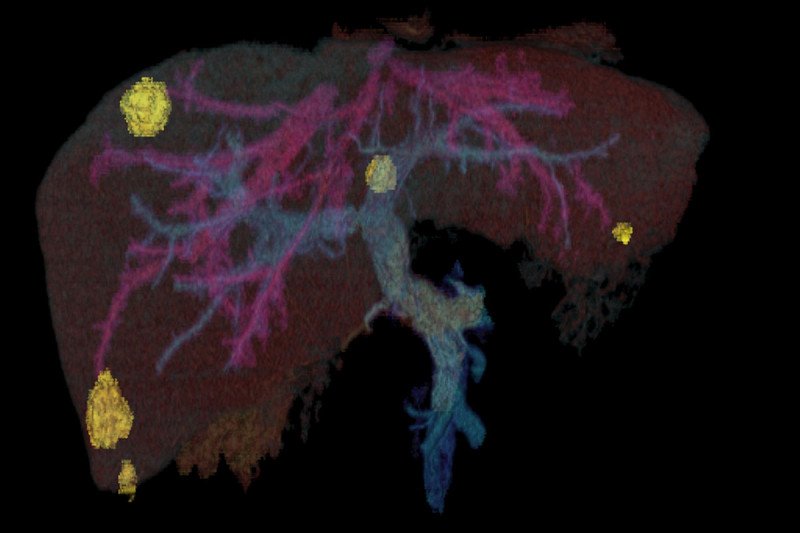
A CT scan of a liver shows where colorectal cancer has spread. The tumors are in yellow.
Many tumors can be eliminated with surgery, chemotherapy, radiation, and other treatments. But once cancer spreads throughout the body, or metastasizes, it becomes much harder to stop. MSK’s doctors and scientists are working on new ways to treat metastatic cancer. These are six commonly asked questions about this condition.
What is metastatic cancer?
Metastatic cancer is commonly called stage IV cancer or advanced cancer. It occurs when cancer cells break off from the original tumor, spread through the bloodstream or lymph vessels to another part of the body, and form new tumors.
Nearby lymph nodes are the most common place for cancer to metastasize. Cancer cells also tend to spread to the liver, brain, lungs, and bones. Certain types of cancer are more likely to spread to certain organs. Melanoma, the most dangerous type of skin cancer, frequently spreads to the brain and lungs. Prostate cancer most often spreads to the bones.
Even after cancer has invaded another organ, it is still identified by the place where it developed. For example, colon cancer that has spread to the liver is not the same as primary liver cancer. Instead, it is called liver metastases or secondary liver cancer. Breast cancer that spreads to the lungs is still treated like breast cancer, not like lung cancer. If the original tumor responds to the hormone-blocking drugs that are often used to treat breast cancer, then metastatic lung tumors are likely to respond to them as well.
What are the symptoms of metastatic cancer?
The symptoms of metastatic cancer vary greatly depending on the type of cancer and where it has spread. For cancer that has spread to the brain, common symptoms include headaches, seizures, and vision problems. For cancer that has spread to the liver, people may have jaundice (yellowing of the skin or eyes), swelling in the legs, fatigue, weight loss, or loss of appetite.
In some instances, the cancer may spread after a person has already been treated for the original tumor. Metastatic tumors may appear months or even years after first treatments. In other cases, people may not be aware of having cancer at all until they notice symptoms from metastatic tumors.
Back to topCan metastatic cancer be treated?
There are many treatments for metastatic cancer. It often depends on where the cancer began and where it has spread. Chemotherapy is most commonly used, along with radiation, to shrink tumors.
Memorial Sloan Kettering doctors are developing many innovative treatments for metastatic cancer. For example:
- Radiation oncologist Kathryn Beal completed a study in 2016 for people with melanoma that has spread to the brain. The treatment combined the immunotherapy drug pembrolizumab (Keytruda®) with a type of radiation treatment called stereotactic radiosurgery. Dr. Beal found that using the the combination, tumors disappeared in 35% of the people treated. Another 30% saw their tumors grow smaller. This is much better than the response to stereotactic radiosurgery alone.
- Our interventional radiologists offer several minimally invasive treatments to people whose cancer has spread to the liver. These include ablation, which uses heat or cold to destroy tumors, and embolization, which blocks a tumor’s blood supply. These procedures can be done several times if needed. They keep many people’s cancer at bay for years.
- Pioneered by medical oncologist Nancy Kemeny, hepatic arterial infusion (HAI) is a way to deliver chemotherapy using a pump surgically implanted in the body to deliver drugs directly to the tumor. According to a recent study, HAI improves average survival by nearly two years in people who have also had liver surgery to remove metastases. More than one-third survive longer than ten years.
Are targeted therapies and immunotherapy used to treat metastatic cancer?
The first step in determining whether a targeted therapy may be effective is to find out whether there are any genetic mutations linked to a person’s cancer. MSK-IMPACT™ is a test developed to analyze gene mutations in tumors. It is available to all MSK patients who have metastatic cancer. The test was designed to find the specific in mutations in tumors that can be treated with targeted drugs. These drugs may include FDA-approved medications or experimental treatments that are available through clinical trials.
In addition to the combination treatment Dr. Beal is studying, there are a number of other immunotherapy options for people with metastatic cancer. These include drugs that are designed to boost the body’s immune response and help it fight cancer, such as nivolumab (Opdivo®). MSK researchers are also conducting clinical trials with CAR T cell therapy. In one trial, immune cells are engineered to seek out and destroy breast and lung tumors that have metastasized to the chest wall.
Back to topIs metastatic cancer curable?
As researchers continue to make advances in treatment, certain types of metastatic cancer increasingly can be cured. These include colon cancer and melanoma. More commonly, however, therapies for metastatic cancer are palliative. This means they reduce symptoms and improve a person’s quality of life but cannot fully get rid of the cancer.
For many people, palliative treatments can keep the disease under control for many years. Some drugs can hold tumors at bay for a long time if patients continue to take them, although resistance may eventually develop. In this way, cancer can become more like a manageable chronic condition, one that allows people to live with the disease for a long time.
Back to topIs there a way to prevent cancer from metastasizing?
At this time, there are no reliable methods for preventing cancer’s spread. The best way to keep cancer from spreading is to remove primary tumors when they are very small, before they have a chance to move to other areas of the body. This is in part why cancer screening is so important. But even when cancer is detected and removed early, tumor cells may already be circulating in the blood and lymph vessels or hiding out in other parts of the body.
Learning more about how tumor cells spread and take root in other parts of the body is an important area of research at many cancer centers, including MSK. Sloan Kettering Institute Director Joan Massagué has been studying the biology behind cancer metastasis for nearly two decades. Read more about Dr. Massagué’s groundbreaking discoveries.
Back to top